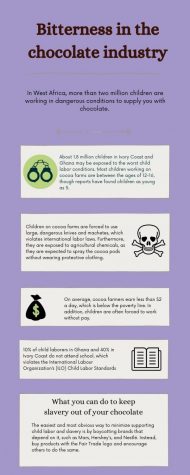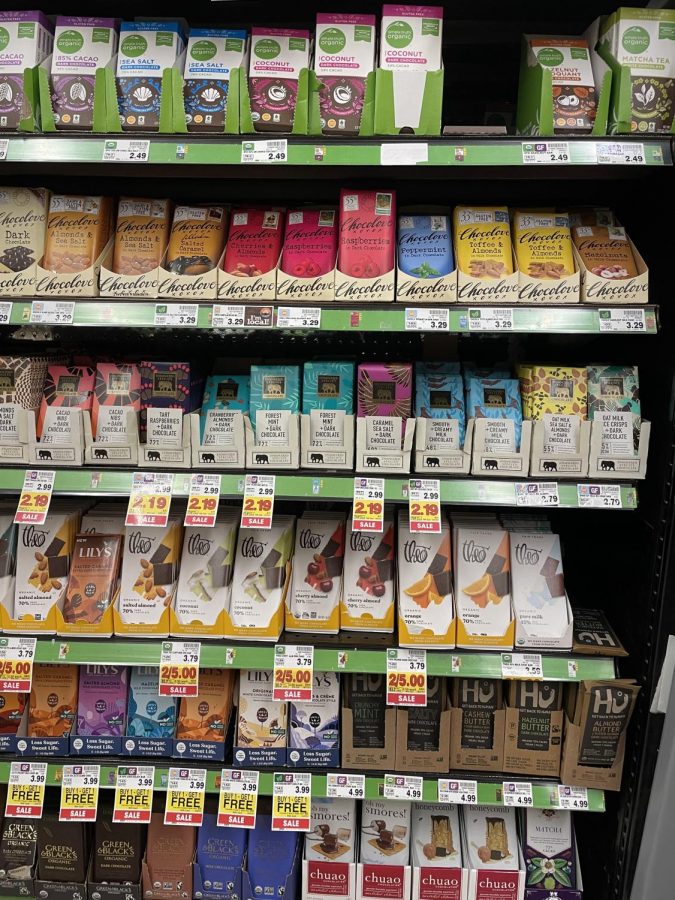The Bitter Truth About The Chocolate Industry
In King Soopers is an aisle dedicated to candy, with shelves full of many different chocolate brands. However, many people don’t know that lots of the chocolate was made from the unpaid labor of children in West Africa. “I think that if we called this the invisible crime, we wouldn’t be wrong,” sophomore Angel Gupta said.
December 3, 2021
Chocolate. It’s everywhere, and it’s unavoidable. Hershey’s, Nestle, Mars; the list goes on. 5.3 million tons of it are produced each year, yet most people don’t stop to wonder where it comes from.
According to the U.S Department of Labor, Ghana and Ivory Coast produce 60% of the world’s chocolate, where 1.56 million children are forced to work on cocoa plantations. In addition, according to the Food Empowerment Project and YPFP, the children often receive no pay and are mistreated and beaten when they try to escape. They are kidnapped, sold into slavery by relatives, or coerced under the false premise of good pay and schooling.
“I think that if we called this the invisible crime, we wouldn’t be wrong,” sophomore Angel Gupta said. “It’s something we never think about, after all.”
When six Malians, who claimed they were forced to work on cocoa plantations, sued Nestle USA and Cargill for slavery, it seemed as though major chocolate corporations would be held accountable for their actions.
The Malians based their case on the Alien Tort Statute (ATS), which is a U.S federal law that gives federal courts authority to hear lawsuits filed by non-U.S citizens for crimes that violate international law. However, the Supreme Court voted 8-1 in favor of the chocolate companies because the abuse happened outside of the U.S.
Despite the ruling, there is something that can be done about it. In most situations, accessing information regarding any problem is the first step to solving it.
“Information is such a powerful tool,” English teacher and UNICEF club sponsor Joel Morris said.
Information is especially important for a topic that isn’t widely talked about.

“I honestly know nothing about slavery in the chocolate industry,” sophomore Sonja Bergstrom said. “But I assume it was bad and the slaves had to work under harsh conditions with little to no freedoms for the benefit of a generally white or European community just like all other slavery.”
Gupta, who has heard about the slavery in the chocolate industry, adds how she is able to make good decisions regarding the purchase of chocolate.
“Luckily, I can feel less guilty eating chocolate by checking brands and how they treat their laborers,” she said.
In addition to staying informed, Morris also suggests finding organizations that would benefit from outside help.
“What you could do is inform yourself and find organizations that might need people on the ground,” he said.
Organizations such as the International Cocoa Initiative work to end the worst forms of forced labor and to protect children working on cocoa plantations. Organizations and donations are a way for people who can’t physically end the abuse to still be able to help.
“I think that locally, what you could do is inform yourself and find organizations that might need people on the ground, or making phone calls or doing things like that,” Morris said. “Think about how your time could be spent because time is the most valuable donation.”
Issues such as child labor on cocoa farms in countries thousands of miles may seem irrelevant to Creek students, but they are still connected. Student’s choices when making purchases can impact what happens halfway across the globe.
“Sometimes [global issues] seem very remote from us, but they can also be so close to home,” Morris said.




![Senior Stefven Klein sits in a tree with his freshly finished, historically accurate, handmade outfit. Klein has been sewing since he was five years old and started making his own clothes only a few years ago. “[Sewing] helps you kind of slow down your mind and focus on what's happening in the moment,” he said. “You realize that if you're putting stress into what you're doing, you're going to mess up, and you need to take that step back to calm yourself down.”](https://unionstreetjournal.com/wp-content/uploads/2021/11/Screenshot_20210411-181906_Video-Player-e1637099117728-300x392.jpg)

















